Search the Special Collections and Archives Portal
Search Results
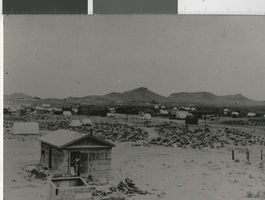
Photograph of the second townsite located in the Goldfield district (Nev.), 1904
Date
1904
Archival Collection
Description
Columbia, Nevada, 1904. There is an inscription on the back of the image: "Looking southeast from Columbia was the second townsite laid out in the Goldfield district. By 1905, Columbia supported a newspaper, school, post office, hotels, saloons, and many other businesses. By 1907, the town's population had reached 1500, but the boom was over by 1910 and the camp's population dropped to less than 500 by 1914. Due to its location near the mines and the large mill of the Goldfield Consolidated Mining Company, Columbia was able to remain in existence, but in 1918 the post office was closed and within a few years most of its residents had moved to nearby Goldfield." There is a date stamp: Christmas 1983.
Image
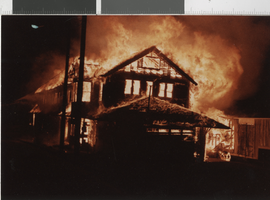
Photograph of Tonopah and Goldfield Railroad depot burning in fire, Tonopah (Nev.), 1980
Date
1980-08-13
Archival Collection
Description
Tonopah and Goldfield Railroad depot fire, August 13, 1980. There is an inscription on the back of the image: "The depot was built in 1904 as the Tonopah terminal of the Tonopah Railroad. In 1905 the Tonopah Railroad merged with the Goldfield Railroad to form the Tonopah and Goldfield Railroad and the depot had been enlarged to a full two story structure by 1910. The building was used by the railroad until it ceased operation in 1947. The building was vacant at the time of fire. Philip Metscher photo." There is a date stamp: mid-year 1984.
Image
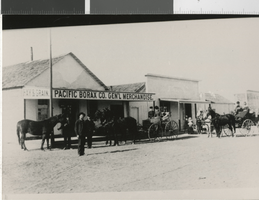
Photograph of Pacific Borax Company in Columbus (Nev.), 1880
Date
1880
Archival Collection
Description
Columbus, Esmeralda County, Nevada, about 1880. There is an inscription on the back of the image: "The Pacific Borax Company was one of four companies mining borax from nearby Columbus Salt Marsh at the time. The borax was discovered in 1872 by Francis M. "Borax" Smith. Columbus, which was settled in 1865, also supported four stamp mills which process the silver ore from the Columbus Mining District (Candelaria). The town's boom years were between 1873-1878 when the population was over 600. Nevada Historical Society Coll." There is a date stamp: Christmas 1984.
Image
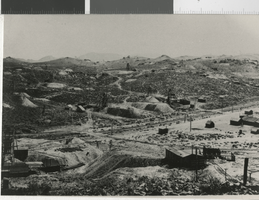
Photograph of Goldfield Mining District in Goldfield (Nev.), 1907
Date
1907
Archival Collection
Description
Goldfield Mining District, Goldfield, NV, 1907. There is an inscription on the back of the image: "Looking east from Florence hill. The numerous mines are only a few of the hundreds operating the district at the time. The newly completed tracks of the Bullfrog Goldfield Railroad, one of four serving Goldfield, can be seen in the center of the photo. Milltown, one of Goldfield's four satellite camps, appears on the right." There is a date stamp: 1985.
Image
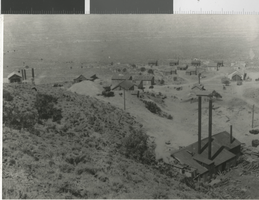
Photograph of Berlin (Nev.), 1905
Date
1905
Archival Collection
Description
Berlin, Nevada 1905. There is an inscription on the back of the image: "Silver ore was discovered at the site in 1895. In 1898 the Nevada Company purchased the claims, developed the mine and installed a 30 stamp mill. Soon Berlin boasted a population of 250. There was a store, post office and a number of saloons in the area. Mining ceased by 1909 and the mill's machinery was removed in 1947. Today Berlin is a ghost town in a state of "arrested decay" and is part of the Berlin-Ichthyosaur Nevada Satate Park. Berlin's mines produced over $800,000. Don E. Lewis Collection." There is a date stamp: Christmas 1985.
Image
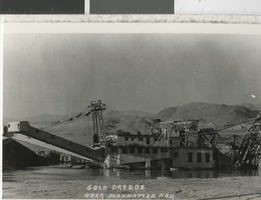
Photograph of Manhattan Dredge in Manhattan (Nev.), 1939
Date
1939
Archival Collection
Description
Manhattan Dredge, Manhattan, Nevada, 1939. There is an inscription on the back of the image: "Known locally as the "Big Boat," the 3,000 ton dredge operation. The dredge began mining in 1938 and shut down in 1946. The operation recovered over $4,500,000 in gold. Water for the dredge's pond was piped to the site from Peavine creek across Smoky Valley." There is a date stamp: 1986.
Image
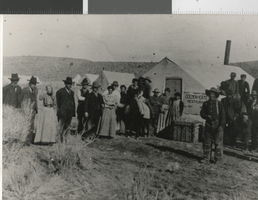
Photograph of Main Street in Palmetto (Nev.), 1906
Date
1906
Archival Collection
Description
Main Street, Palmetto, Esmeralda County, Nevada, 1906. There is an inscription on the back of the image: "Located 12 miles west of Lida, Nevada, Paletto was founded in 1866 after the discovery of silver in the area. The camp died and was reborn several times, the last of which was in 1906. Palmetto was named after the local joshua which its founders mistakenly thought was a relative of the palm tree. The district's mine eventually produced over $6,000,000. Nevada Historical Society Collection." There is a date stamp: mid-year 1986. Street Address: Main Street
Image
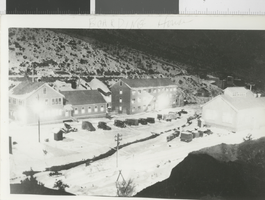
Photograph of Treadwell-Yukon operation in Tybo (Nev.), 1930
Date
1930-12
Archival Collection
Description
Treadwell-Yukon Co. Operation, Tybo, Nevada, December, 1930. There is a date stamp: Christmas, 1977.
Image
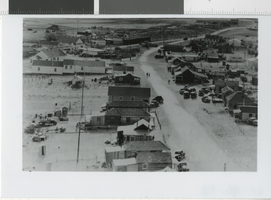
Photograph of Main Street in Silver Peak (Nev.), 1938
Date
1938
Archival Collection
Description
Main Street, Silver Peak, Nevada, 1938. There is an inscription on the back of the image: "In 1938, Silver Peak was Esmeralda County's largest and most prosperous town, boasting a population of over 1,000. The economy was supported chiefly by the nearby mines of the Nivloc and Mary Mine areas. The town's prosperity ended when the mines closed with the beginning of WWII." The section of town in the upper left corner of the photo, which included the post office, several stores and a theater was destroyed by fire in 1948. There is a date stamp: Christmas, 1986.
Image
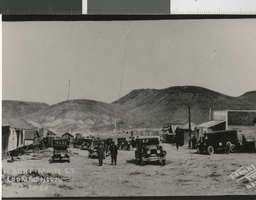
Photograph of Gilbert (Nev.), 1925
Date
1925-02-25
Archival Collection
Description
Gilbert, Nevada, February 25, 1925. Gilbert was located in the Monte Cristo Range, 26 miles west of Tonopah. There is an inscription on the back of the image: "The town was founded as the result of a rich gold strike in the area by the Gilbert brothers in 1924. At its height (1925-1927), the town's population exceeded 400. After the boom, the mines maintained a small, steady production until World War II eventually forced them to close. In addition to gold, the district produced lead, silver and high grade turquoise. Nevada Historical Society Collection." There is a date stamp: 1987.
Image
Pagination
Refine my results
Content Type
Creator or Contributor
Subject
Archival Collection
Digital Project
Resource Type
Year
Material Type
Place
Language
